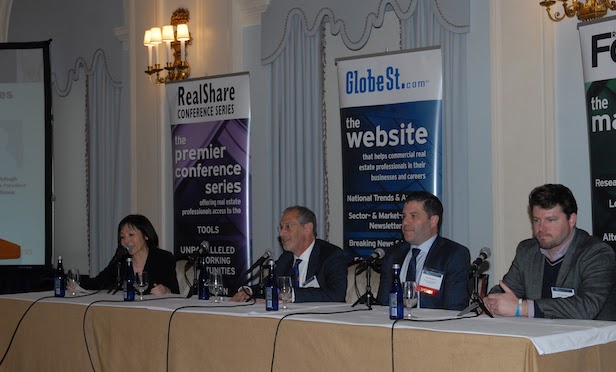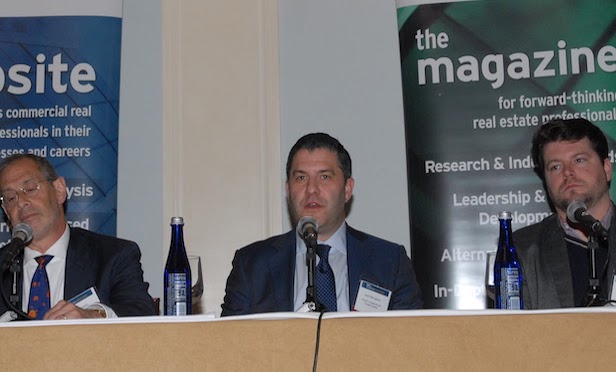 From left: Betsy Kim, Seth Bornstein, Josh Weingarten, Zach McHugh/ Photo by Charles Garnar
From left: Betsy Kim, Seth Bornstein, Josh Weingarten, Zach McHugh/ Photo by Charles Garnar
NEW YORK CITY— “This solidifies New York City, and Queens in particular is a tech capital in the US,” said Seth Bornstein, executive director, Queens Economic Development Corporation. He came to the RealShare New York 2018 event at the Yale Club in Midtown Manhattan directly from the press conference where Governor Andrew Cuomo and Mayor Bill de Blasio announced Amazon selected Long Island City for its new HQ2.
A Different “Amazon Effect” with HQ2
The governor and mayor's joint announcement stated Amazon would invest $3.6 billion, creating 25,000 new jobs by 2029 and up to 40,000 jobs by 2034. Salaries would average more than $150,000.
News organizations questioned state and city incentives for Amazon, calculated to top $2.8 billion. But panelists Josh Weingarten, director of capital markets at Triangle Equities, and Zach McHugh, SVP at Sitex Group, joined Bornstein voicing support for the HQ2. Amazon had also selected a suburb of Arlington, VA, for its other HQ2.
State and city officials say the Amazon deal is the largest economic development project in New York's history. As the East Coast bureau chief and reporter covering New York City for ALM Media Group, I moderated the panel, “Last Mile and Urban Logistics Facilities.”
Triangle Equities is developing the Terminal Logistics Center, a 300,000 square-foot, multilevel industrial property near JFK Airport. Weingarten described the Amazon news as part of a rising tide where all asset types would benefit, including office, multifamily and even self-storage.
“There is a lot of dry powder, capital that's on the sidelines looking for the right opportunity to invest and will be ready to strike,” said Weingarten.
Investing in Last Mile Warehouses
When asked about industrial prices, he said, “Industrial wants to come into the urban core but the run up of land prices has pushed last mile a little further from Long Island City.” He added that prices were already high and they will only increase.
Headquartered in NJ, Sitex Group is a real estate private equity firm that exclusively acquires, redevelops and repositions US industrial assets. McHugh noted the pricing now in Queens for industrial is from $125 to $165 per square foot.
 From left: Seth Bornstein, Josh Weingarten, Zach McHugh/ Photo by Charles Garnar
From left: Seth Bornstein, Josh Weingarten, Zach McHugh/ Photo by Charles GarnarWeingarten said the asking price of land for development in Long Island City is already pushing $300 per square foot, and even at $150 per square foot, rents need to be in the low $30s per square foot. “It will be hard to justify new construction for logistics real estate in those areas and new projects will make more sense further out in Queens and Brooklyn,” he explained.
With industrial properties, the demand is driven by consumption. “As long as we're watching the growth of e-commerce we should have a good signal of what's going to come in the short-term,” Weingarten said.
E-commerce accounts for only about 10% of all retail, according to Statista, an online market research portal. Weingarten says that's projected to double in the next five to 10 years which will continue to drive up the demand for industrial assets.
The Amazon Effect and Groceries
Weingarten and McHugh agreed that e-commerce has only started to scratch the surface with grocery products.
Food is a basic necessity that needs to be affordable and accessible. Amazon acquired Whole Foods in June 2017 for $13.7 billion. Thus, it makes sense to expect this category to expand in online retail. But McHugh cautioned, “Quality control for e-commerce food companies will remain a challenge.”
Weingarten said distribution centers closer to urban core areas and better technology would also help this market expand. Both panelists see substantial growth in online grocery shopping in the future.
E-Commerce and Infrastructure
Weingarten said that 9% of private sector jobs in New York City are freight dependent. A well functioning freight network is necessary for a city to grow and remain competitive in the instant delivery of e-commerce purchases. He opined that the city should work with the private sector, offering tax abatements as incentives for developing new warehouse facilities and loosening restrictions regarding the use of trucks on limited roads.
As part of infrastructure, well maintained roads and public transportation are critical. McHugh noted industrial parking is also particularly crucial. This is not only for employees but also for delivery trucks.
Even prior to Amazon's announcement there were serious infrastructure needs, according to Bornstein. He said the HQ2 should serve as a catalyst to jump start these necessary improvements.
© 2025 ALM Global, LLC, All Rights Reserved. Request academic re-use from www.copyright.com. All other uses, submit a request to [email protected]. For more information visit Asset & Logo Licensing.








